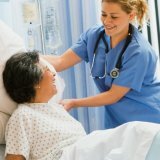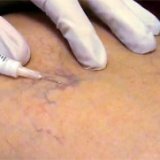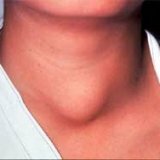Diverticulosis of the large intestine

Disease in which small saccular protrusions form in the wall of the intestine, otherwise diverticula( up to 1-2 cm) are called diverticulosis of the large intestine. Diverticulum diverticuli are formed mainly in the elderly and people living in economically developed countries.
The causes of diverticulosis of the colon
The main role in spreading diverticulosis is the decrease in the amount of plant foods in the diet and the predominance of flour dishes and meat in the menu, which contributes to the appearance of constipation. In addition to constipation, the formation of diverticula in the colon contribute to: flatulence( profuse gas), obesity, prolonged and uncontrolled intake of laxatives, transferred intestinal infections. All these factors contribute to the appearance of weakness of the intestinal wall( the tonus of the musculature of the colon decreases, the muscle shell becomes thinner, the supporting connective tissue becomes less elastic).Weak intestinal wall with bulging intestinal pressure protrudes outward. Diverticula are mainly localized in the sigmoid and descending colon.
What are the symptoms of colon diverticulosis?
In medicine, three forms of this disease are distinguished. These are asymptomatic diverticula, when they are accidentally detected during a colonoscopy or an irrigoscopy. Also uncomplicated form of diverticular disease, when there are clinical manifestations and diverticular disease with subsequent complications.
In uncomplicated diverticulosis there are no characteristic signs, patients have symptoms that are characteristic of the syndrome of colon lesions. These are abdominal pain without clear localization, signs of intestinal dyspepsia( bloating, rumbling), stool, mostly unstable stools or constipation( constipation and diarrhea).
The most common complication of diverticulosis of the colon is inflammation of diverticula, otherwise diverticulitis. This is facilitated by violations of the evacuation of contents from the diverticula themselves, as well as the intestinal dysbiosis. Quite often acquires a diverticulitis chronic recurrent course. Symptoms of diverticulitis are: increased pain in the abdomen, fever, persistent flatulence, diarrhea, the appearance in the stool of mucus and blood. Quite often, patients are hospitalized with the diagnosis of an "acute" abdomen in the surgical department.
Severe complication of diverticulum can be intestinal bleeding. Appear in the form of clots or discharge in the stool of blood. Bleeding can occur suddenly and stop suddenly too.
In the case of diverticulosis of the large intestine, spikes can form which lead to intestinal obstruction. The development of diffuse peritonitis complicates the perforation of the diverticulum.
Treatment of diverticulosis of the colon
To diagnose diverticula in the large intestine, use such diagnostic methods as irrigoscopy and colonoscopy.
Treatment of this disease provides a comprehensive treatment. When identifying uncomplicated diverticulosis of the intestine, the main task is to regulate the stool. This, to some extent, makes it possible to prevent the development of new diverticula, and also to prevent complications. With this purpose, specialists are assigned a special diet( vegetable fiber), medicines that affect the elimination of dysbiosis and intestinal motility, oily laxatives.
When a patient develops diverticulitis, he is hospitalized, anti-inflammatory treatment is prescribed with antibacterial agents, antispasmodics and enzymes. With bleeding in 80% of cases it can be stopped by conservative methods of treatment. This infusion therapy, gemostatiki, irrigoskopiya( in some cases has a curative effect), bed rest. If such methods of treatment do not bring a positive effect, then an operation is performed. Its essence in the removal of the colon segment together with the bleeding vessel( mainly left-side hemicolectomy)
Diverticulosis of the gut is a serious enough disease that can lead to negative consequences, therefore, if symptoms of the disease appear, you should immediately contact a specialist.



